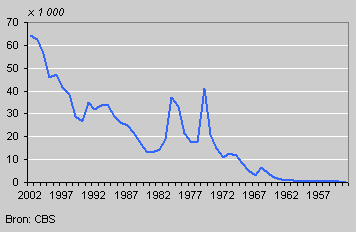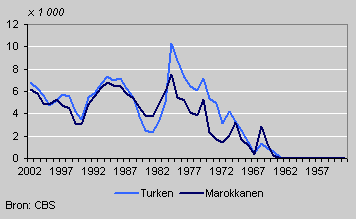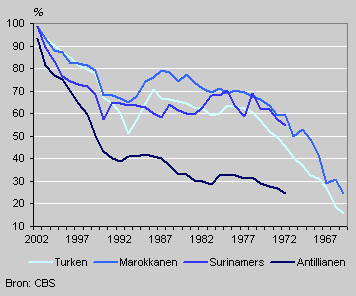Two in every three immigrants from Morocco are still living in the Netherlands

Two in every three Moroccans who immigrated to the Netherlands during the last fifty years were still living here on 1 January 2003. The proportion for Turkish immigrants is slightly lower, namely three in five. Most labour immigrants who came to the Netherlands in the 1960s, however, returned to their country of birth.
First generation non-western immigrants by year of arrival, 1 January 2003

Turks and Moroccans
Most labour migrants who came to the Netherlands in the late 1960s and early 1970s did not stay here permanently.
This also applies to the first Turkish and Moroccan labour migrants who came in the mid-1960s. Approximately 30 percent of Moroccan and 15 percent of Turkish immigrants who settled in the Netherlands in 1965 and 1966 were still living here on 1 January 2003.
Most migrants who came to the Netherlands more recently stayed here. Almost half of Turks and 55 percent of Moroccans who arrived here in 1972 and 1973 came here to stay.
First generation Turks and Moroccans by year of arrival, 1 January 2003

Follow-on migration: wife and children come to settle
Labour migrants who came to stay subsequently sought family reunion. Thus immigration from Turkey and Morocco increased from 1973 onwards while, at the same time, labour migration from these countries came to a halt. The majority of Turks and Moroccans who came to the Netherlands after 1973 settled here.
About two-thirds of Turks who came in the 1970s and 1980s are still living here. The amount of Moroccan immigrants who came to the Netherlands during the last two decades and settled here was considerably higher: 75 to 85 percent.
Immigrants still living in the Netherlands by year of arrival, 1 January 2003

Surinamese and Antilleans
Immigration from Surinam and the Netherlands Antilles peaked in 1975 and 1980. Approximately two-thirds of Surinamese immigrants are still living in the Netherlands. The proportion for Antilleans is much lower. Just about 30 percent of Antilleans who came to the Netherlands in the 1970s are still living here.
Ron Tas